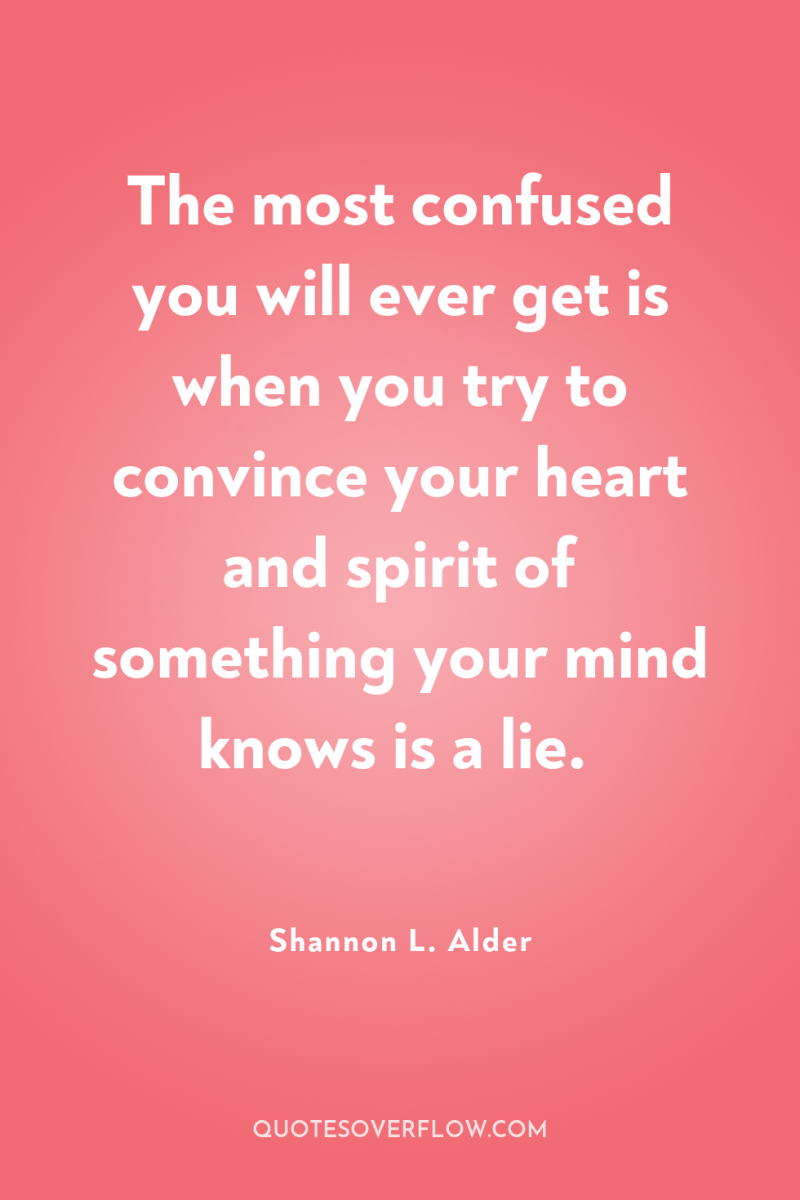
1
The most confused you will ever get is when you try to convince your heart and spirit of something your mind knows is a lie.Shannon L. Alder
2
I like the scientific spirit–the holding off, the being sure but not too sure, the willingness to surrender ideas when the evidence is against them: this is ultimately fine–it always keeps the way beyond open–always gives life, thought, affection, the whole man, a chance to try over again after a mistake–after a wrong guess.Walt Whitman
3
Poetry is just the evidence of life. If your life is burning well, poetry is just the ash.Leonard Cohen
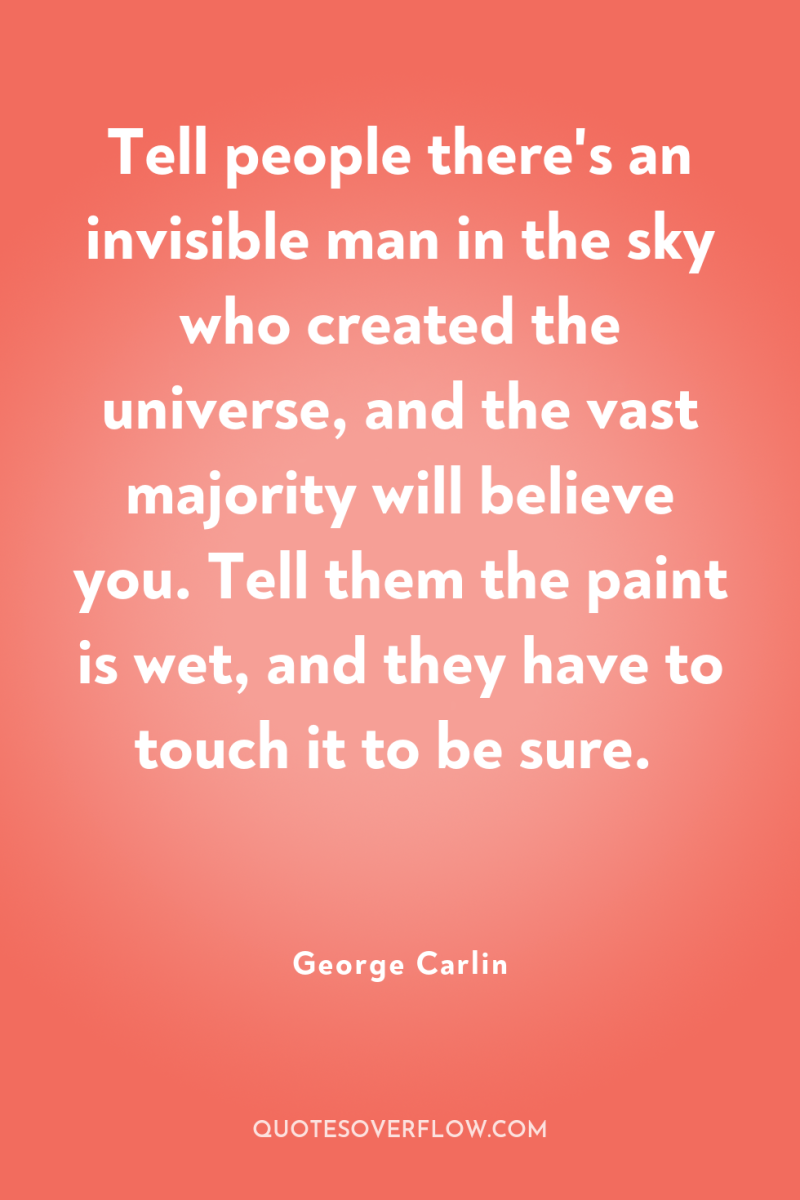
4
Tell people there's an invisible man in the sky who created the universe, and the vast majority will believe you. Tell them the paint is wet, and they have to touch it to be sure.George Carlin
5
Each religion makes scores of purportedly factual assertions about everything from the creation of the universe to the afterlife. But on what grounds can believers presume to know that these assertions are true? The reasons they give are various, but the ultimate justification for most religious people’s beliefs is a simple one: we believe what we believe because our holy scriptures say so. But how, then, do we know that our holy scriptures are factually accurate? Because the scriptures themselves say so. Theologians specialize in weaving elaborate webs of verbiage to avoid saying anything quite so bluntly, but this gem of circular reasoning really is the epistemological bottom line on which all 'faith' is grounded. In the words of Pope John Paul II: 'By the authority of his absolute transcendence, God who makes himself known is also the source of the credibility of what he reveals.' It goes without saying that this begs the question of whether the texts at issue really were authored or inspired by God, and on what grounds one knows this. 'Faith' is not in fact a rejection of reason, but simply a lazy acceptance of bad reasons. 'Faith' is the pseudo-justification that some people trot out when they want to make claims without the necessary evidence. But of course we never apply these lax standards of evidence to the claims made in the other fellow’s holy scriptures: when it comes to religions other than one’s own, religious people are as rational as everyone else. Only our own religion, whatever it may be, seems to merit some special dispensation from the general standards of evidence. And here, it seems to me, is the crux of the conflict between religion and science. Not the religious rejection of specific scientific theories (be it heliocentrism in the 17th century or evolutionary biology today); over time most religions do find some way to make peace with well-established science. Rather, the scientific worldview and the religious worldview come into conflict over a far more fundamental question: namely, what constitutes evidence. Science relies on publicly reproducible sense experience (that is, experiments and observations) combined with rational reflection on those empirical observations. Religious people acknowledge the validity of that method, but then claim to be in the possession of additional methods for obtaining reliable knowledge of factual matters – methods that go beyond the mere assessment of empirical evidence – such as intuition, revelation, or the reliance on sacred texts. But the trouble is this: What good reason do we have to believe that such methods work, in the sense of steering us systematically (even if not invariably) towards true beliefs rather than towards false ones? At least in the domains where we have been able to test these methods – astronomy, geology and history, for instance – they have not proven terribly reliable. Why should we expect them to work any better when we apply them to problems that are even more difficult, such as the fundamental nature of the universe? Last but not least, these non-empirical methods suffer from an insuperable logical problem: What should we do when different people’s intuitions or revelations conflict? How can we know which of the many purportedly sacred texts – whose assertions frequently contradict one another – are in fact sacred?.Alan Sokal
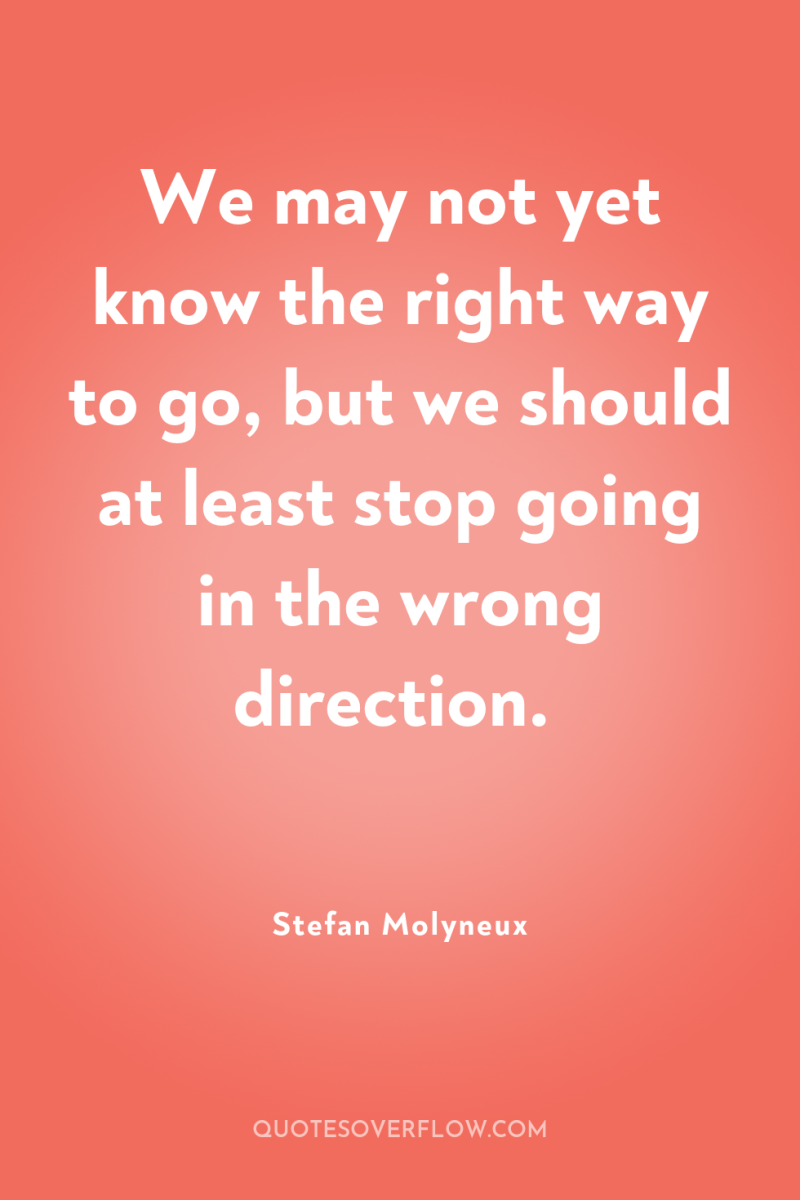
6
We may not yet know the right way to go, but we should at least stop going in the wrong direction.Stefan Molyneux
7
We all know that any emotional bias -- irrespective of truth or falsity -- can be implanted by suggestion in the emotions of the young, hence the inherited traditions of an orthodox community are absolutely without evidential value.. If religion were true, its followers would not try to bludgeon their young into an artificial conformity; but would merely insist on their unbending quest for truth, irrespective of artificial backgrounds or practical consequences. With such an honest and inflexible openness to evidence, they could not fail to receive any real truth which might be manifesting itself around them. The fact that religionists do not follow this honourable course, but cheat at their game by invoking juvenile quasi-hypnosis, is enough to destroy their pretensions in my eyes even if their absurdity were not manifest in every other direction. .H.P. Lovecraft
8
..What I have denied and what my reason compels me to deny, is the existence of a Being throned above us as a god, directing our mundane affairs in detail, regarding us as individuals, punishing us, rewarding us as human judges might. When the churches learn to take this rational view of things, when they become true schools of ethics and stop teaching fables, they will be more effective than they are to-day.. If they would turn all that ability to teaching this one thing — the fact that honesty is best, that selfishness and lies of any sort must surely fail to produce happiness — they would accomplish actual things. Religious faiths and creeds have greatly hampered our development. They have absorbed and wasted some fine intellects. That creeds are getting to be less and less important to the average mind with every passing year is a good sign, I think, although I do not wish to talk about what is commonly called theology. The criticisms which have been hurled at me have not worried me. A man cannot control his beliefs. If he is honest in his frank expression of them, that is all that can in justice be required of him. Professor Thomson and a thousand others do not in the least agree with me. His criticism of me, as I read it, charged that because I doubted the soul’s immortality, or ‘personality, ’ as he called it, my mind must be abnormal, ‘pathological, ’ in other, words, diseased.. I try to say exactly what I honestly believe to be the truth, and more than that no man can do. I honestly believe that creedists have built up a mighty structure of inaccuracy, based, curiously, on those fundamental truths which I, with every honest man, must not alone admit but earnestly acclaim. I have been working on the same lines for many years. I have tried to go as far as possible toward the bottom of each subject I have studied. I have not reached my conclusions through study of traditions; I have reached them through the study of hard fact. I cannot see that unproved theories or sentiment should be permitted to have influence in the building of conviction upon matters so important. Science proves its theories or it rejects them. I have never seen the slightest scientific proof of the religious theories of heaven and hell, of future life for individuals, or of a personal God. I earnestly believe that I am right; I cannot help believing as I do.. I cannot accept as final any theory which is not provable. The theories of the theologians cannot be proved. Proof, proof! That is what I always have been after; that is what my mind requires before it can accept a theory as fact. Some things are provable, some things disprovable, some things are doubtful. All the problems which perplex us, now, will, soon or late, be solved, and solved beyond a question through scientific investigation. The thing which most impresses me about theology is that it does not seem to be investigating. It seems to be asserting, merely, without actual study.. Moral teaching is the thing we need most in this world, and many of these men could be great moral teachers if they would but give their whole time to it, and to scientific search for the rock-bottom truth, instead of wasting it upon expounding theories of theology which are not in the first place firmly based. What we need is search for fundamentals, not reiteration of traditions born in days when men knew even less than we do now.] .Thomas A. Edison
9
Let's say that the consensus is that our species, being the higher primates, Homo Sapiens, has been on the planet for at least 100, 000 years, maybe more. Francis Collins says maybe 100, 000. Richard Dawkins thinks maybe a quarter-of-a-million. I'll take 100, 000. In order to be a Christian, you have to believe that for 98, 000 years, our species suffered and died, most of its children dying in childbirth, most other people having a life expectancy of about 25 years, dying of their teeth. Famine, struggle, bitterness, war, suffering, misery, all of that for 98, 000 years. Heaven watches this with complete indifference. And then 2000 years ago, thinks 'That's enough of that. It's time to intervene, ' and the best way to do this would be by condemning someone to a human sacrifice somewhere in the less literate parts of the Middle East. Don't lets appeal to the Chinese, for example, where people can read and study evidence and have a civilization. Let's go to the desert and have another revelation there. This is nonsense. It can't be believed by a thinking person. Why am I glad this is the case? To get to the point of the wrongness of Christianity, because I think the teachings of Christianity are immoral. The central one is the most immoral of all, and that is the one of vicarious redemption. You can throw your sins onto somebody else, vulgarly known as scapegoating. In fact, originating as scapegoating in the same area, the same desert. I can pay your debt if I love you. I can serve your term in prison if I love you very much. I can volunteer to do that. I can't take your sins away, because I can't abolish your responsibility, and I shouldn't offer to do so. Your responsibility has to stay with you. There's no vicarious redemption. There very probably, in fact, is no redemption at all. It's just a part of wish-thinking, and I don't think wish-thinking is good for people either. It even manages to pollute the central question, the word I just employed, the most important word of all: the word love, by making love compulsory, by saying you MUST love. You must love your neighbour as yourself, something you can't actually do. You'll always fall short, so you can always be found guilty. By saying you must love someone who you also must fear. That's to say a supreme being, an eternal father, someone of whom you must be afraid, but you must love him, too. If you fail in this duty, you're again a wretched sinner. This is not mentally or morally or intellectually healthy. And that brings me to the final objection - I'll condense it, Dr. Orlafsky - which is, this is a totalitarian system. If there was a God who could do these things and demand these things of us, and he was eternal and unchanging, we'd be living under a dictatorship from which there is no appeal, and one that can never change and one that knows our thoughts and can convict us of thought crime, and condemn us to eternal punishment for actions that we are condemned in advance to be taking. All this in the round, and I could say more, it's an excellent thing that we have absolutely no reason to believe any of it to be true.Christopher Hitchens
10
Never judge someone's character based on the words of another. Instead, study the motives behind the words of the person casting the bad judgment. An honest woman can sell tangerines all day and remain a good person until she dies, but there will always be naysayers who will try to convince you otherwise. Perhaps this woman did not give them something for free, or at a discount. Perhaps too, that she refused to stand with them when they were wrong – or just stood up for something she felt was right. And also, it could be that some bitter women are envious of her, or that she rejected the advances of some very proud men. Always trust your heart. If the Creator stood before a million men with the light of a million lamps, only a few would truly see him because truth is already alive in their hearts. Truth can only be seen by those with truth in them. He who does not have Truth in his heart, will always be blind to her. .Suzy Kassem
11
The search for truth takes you where the evidence leads you, even if, at first, you don't want to go there.Bart D. Ehrman
12
It is debatable whether blind faith is truly faith at all. Faith is the perceptive gray area where scientific facts meet an individual's experiential truths - the extreme of the former is left feeling in the dark whereas the latter is caught blinded by the light. By proper scientific method, it is intellectually dishonest for me to declare the existence of God with utmost certainty, but to my individual spirit, I would be intellectually dishonest to deny the existence of God even for a second. This leaves the best of both worlds, as the believer is called to be able to give reasons for his faith, a deviation from mere fantasy. .Criss Jami
![[E]xceptional claims demand exceptional evidence.](https://cdn.quotesoverflow.com/file/quotesoverflow/images/exceptional-claims-demand-exceptional-evidence-352437571624-1200.webp)
13
[E]xceptional claims demand exceptional evidence.Christopher Hitchens
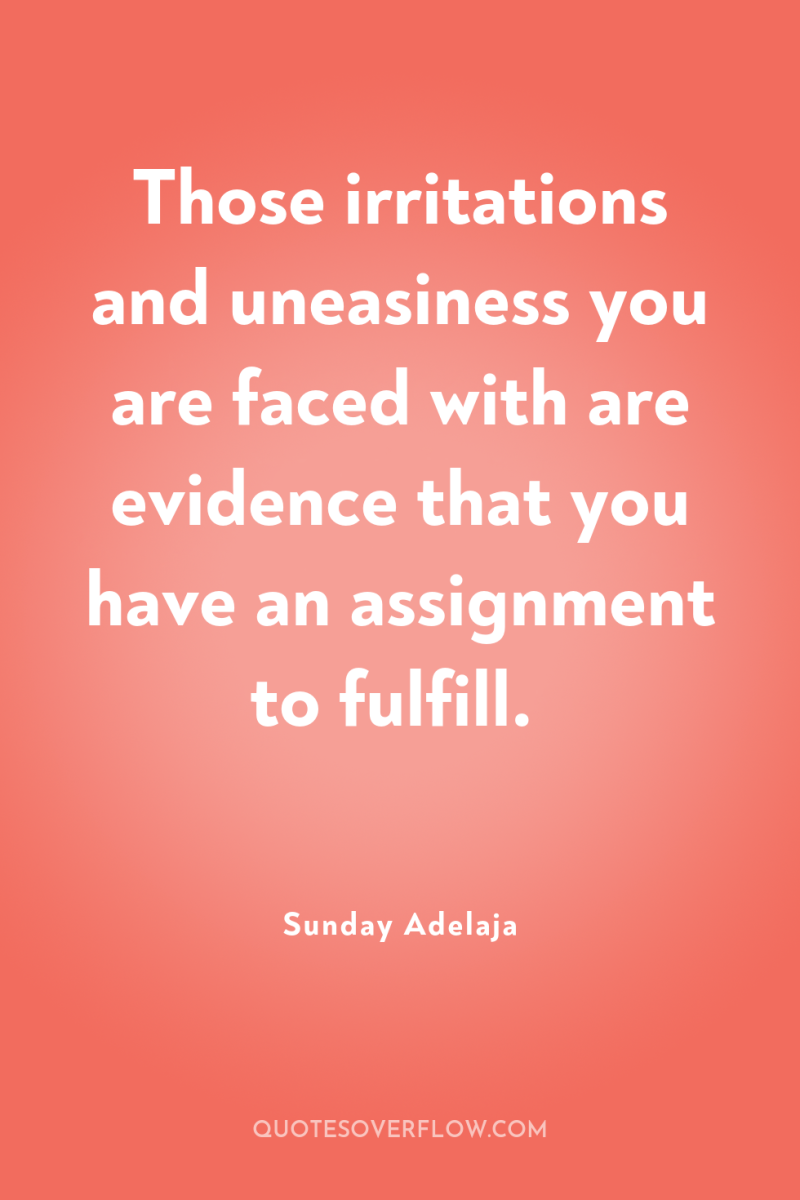
14
Those irritations and uneasiness you are faced with are evidence that you have an assignment to fulfill.Sunday Adelaja
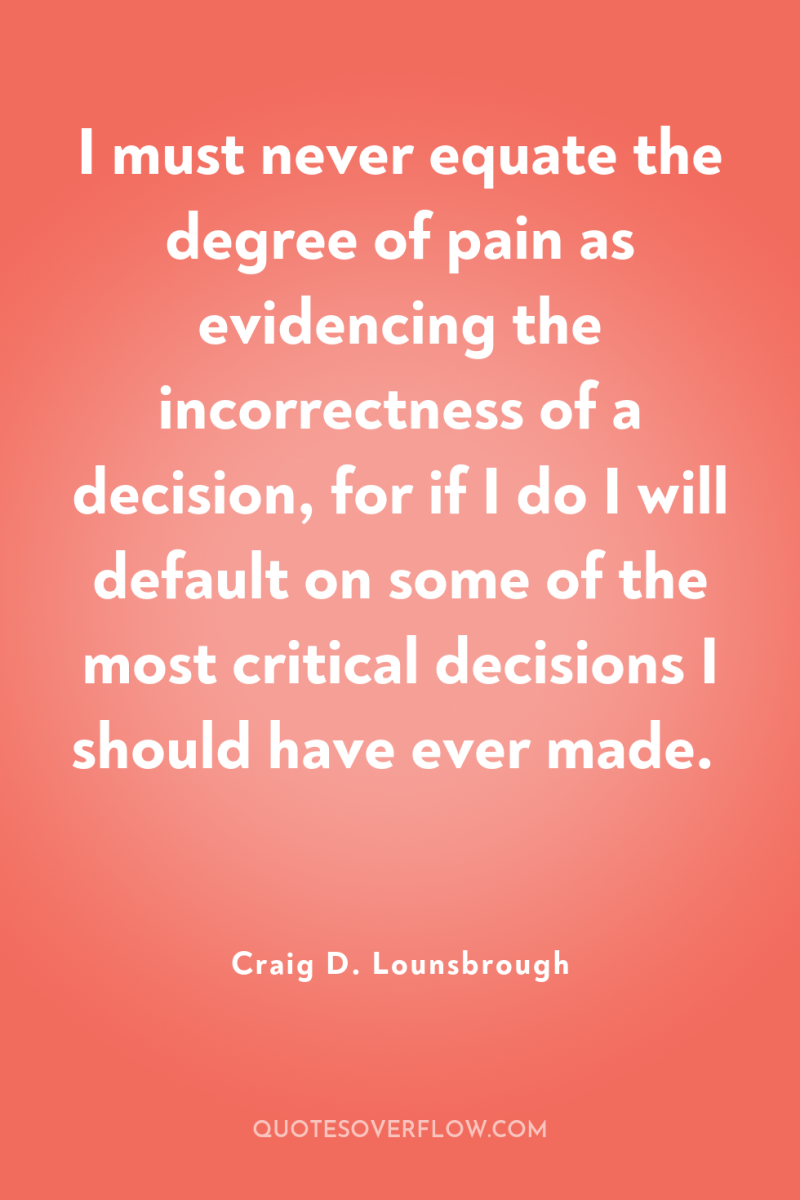
15
I must never equate the degree of pain as evidencing the incorrectness of a decision, for if I do I will default on some of the most critical decisions I should have ever made.Craig D. Lounsbrough
16
I don’t know why everyoneis still trying to find out whether heaven and hell exist. Why do we need more evidence? They exist here on this very Earth.Heaven is standing atop Mount Qasiounoverlooking the Damascene sightswith the wind carrying Qabbani’sdulcet words all around you. And hell is only four hours away in Aleppo where children’s cries drown out the explosions of mortar bombsuntil they lose their voice, their families, and their limbs. Yes, hell certainly does existright now, at this moment, as I pen this poem. And all we’re doingto extinguish this hellfireis sighing, shrugging, liking, and sharing. Tell me: what exactly does that makeus? Are we any better than the gatekeepers of hell? .Kamand Kojouri
17
All of these teeth had once been in real, live people. They had talked and smiled and eaten and sang and cursed and prayed. They had brushed and flossed and died. In English class, we read poems about death, but here, right in front of me was a poem about death too.Gabrielle Zevin
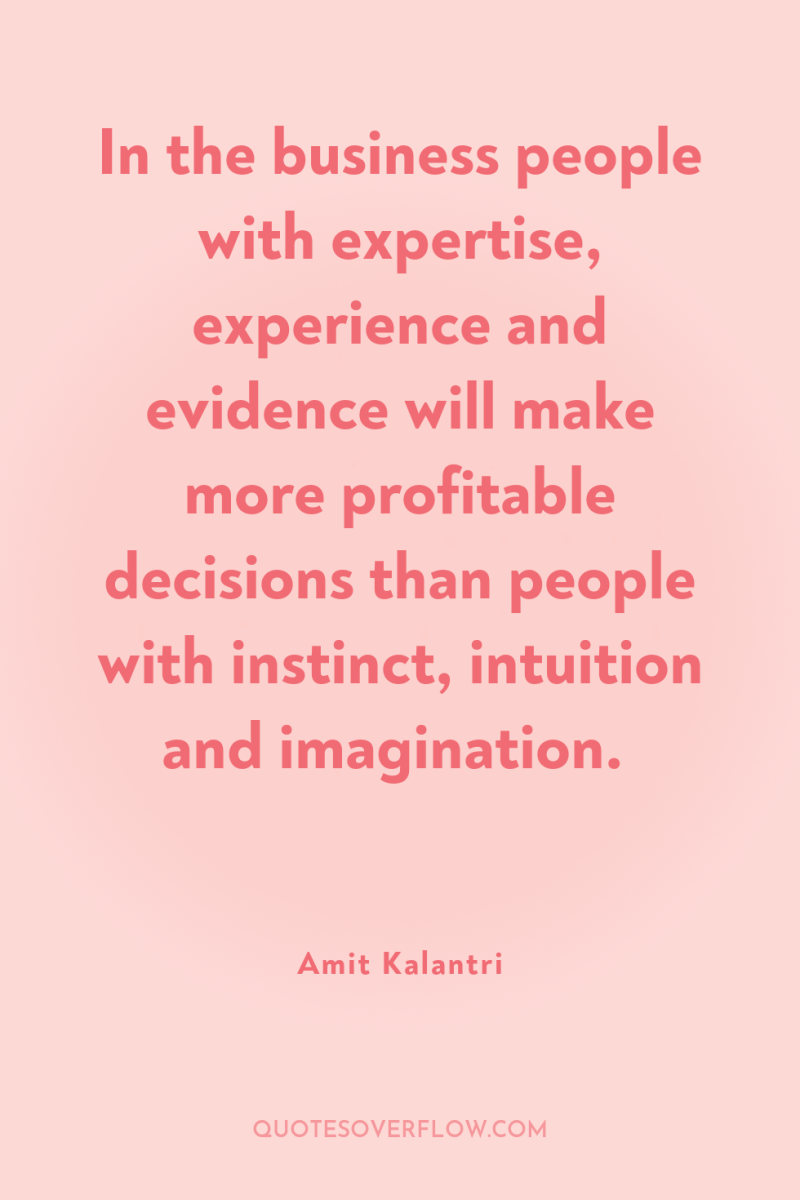
18
In the business people with expertise, experience and evidence will make more profitable decisions than people with instinct, intuition and imagination.Amit Kalantri
19
The difference between faith and insanity is that faith is the ability to hold firmly to a conclusion that is incompatible with the evidence, whereas insanity is the ability to hold firmly to a conclusion that is incompatible with the evidence.William Harwood
20
The creation of man is evidence for the love of God, the preservation of man is evidence for the patience of God, and Christ is evidence for the forgiveness of God. It is when we are wrapped up in our own little peeves that we begin to displace His benevolence with malevolence.Criss Jami
21
The claim that science can disprove God’s existence is an honest ambition but it is a statement that is actually impossible to back up. This is because the task of proving something like science is unprovable by scientific methods. How do you prove an idea like “science”? What container do you use to measure it? What laws of science do you use to prove science? That’s the first reason why the worldview of scientism, the belief that science proves everything, fails to work out in real life. Science cannot prove everything because it cannot even prove itself. .Jon Morrison
22
For as long as we are led by belief, we can never know anything for certain. It is not enough to believe or to have faith, we must know beyond all doubt. For that, we have no other option, but to search, question and investigate! There is no shame in not having found God, Brahman or the Great Spirit, but it is gravely ignorant to dismiss their existence on hearsay.Unknown
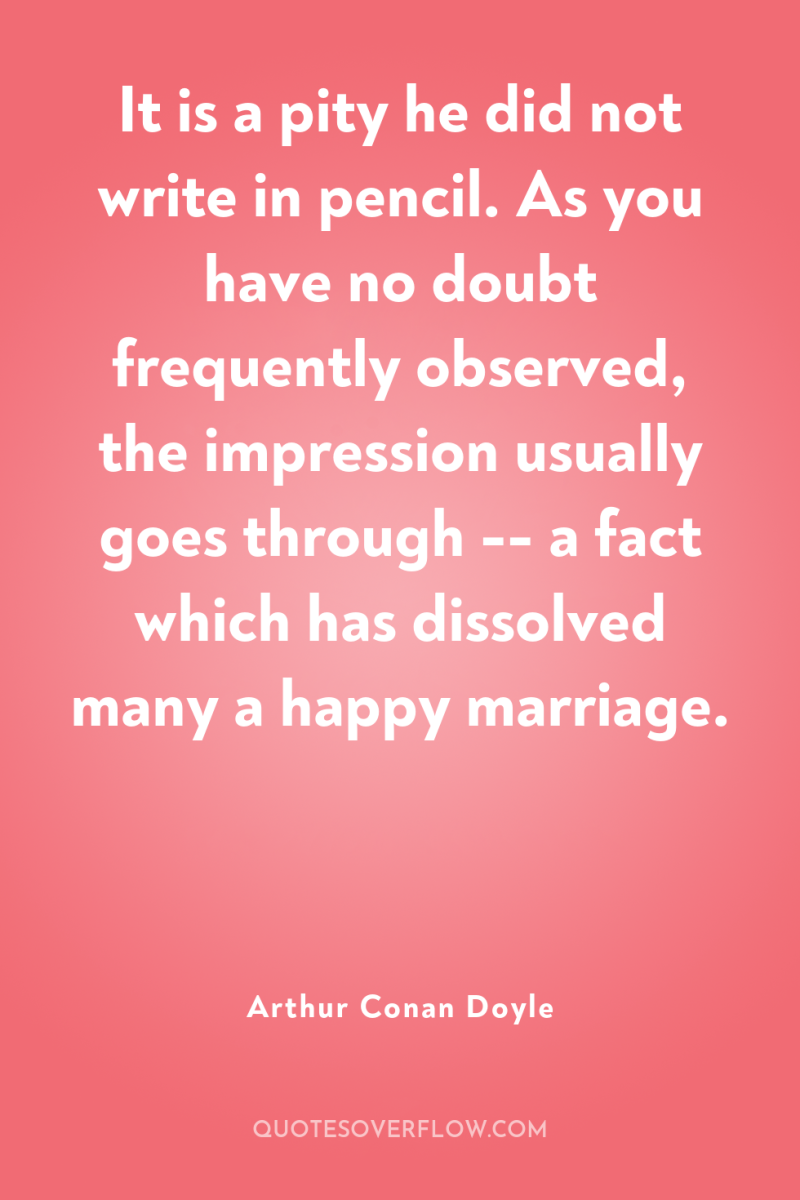
23
It is a pity he did not write in pencil. As you have no doubt frequently observed, the impression usually goes through -- a fact which has dissolved many a happy marriage.Arthur Conan Doyle
24
When even the brightest mind in our world has been trained up from childhood in a superstition of any kind, it will never be possible for that mind, in its maturity, to examine sincerely, dispassionately, and conscientiously any evidence or any circumstance which shall seem to cast a doubt upon the validity of that superstition. I doubt if I could do it myself.Mark Twain
25
My main reason for scepticism about the Huxley/Sagan theory is that the human brain is demonstrably eager to see faces in random patterns, as we know from scientific evidence, on top of the numerous legends about faces of Jesus, or the Virgin Mary, or Mother Teresa, being seen on slices of toast, or pizzas, or patches of damp on a wall. This eagerness is enhanced if the pattern departs from randomness in the specific direction of being symmetrical.Richard Dawkins
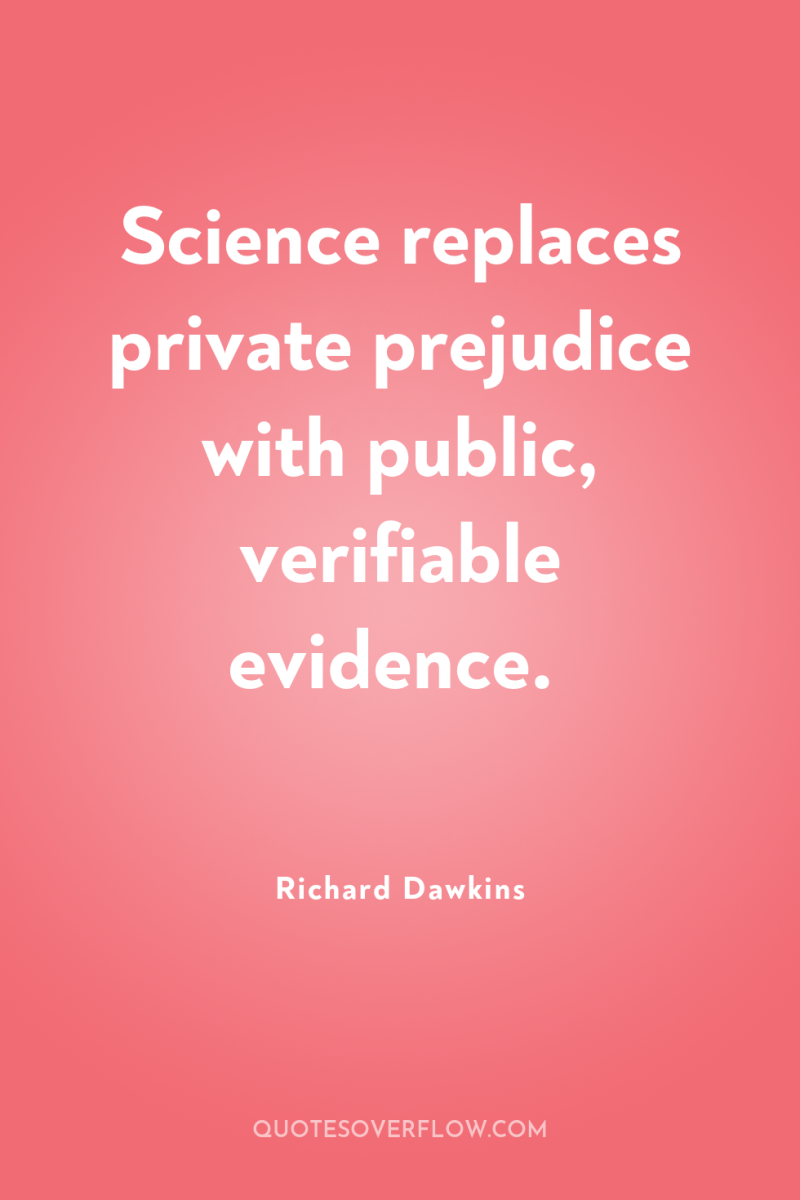
26
Science replaces private prejudice with public, verifiable evidence.Richard Dawkins
27
Experience cannot beat logic, and interpretations of observational evidence which are not in line with the laws of logical reasoning are no refutation of these but the sign of a muddled mind (or would one accept someone’s observational report that he had seen a bird that was red and non-red all over at the same time as a refutation of the law of contradiction rather than the pronouncement of an idiot?).HansHermann Hoppe
28
For the most part, people strenuously resist any redefinition of morality, because it shakes them to the very core of their being to think that in pursuing virtue they may have been feeding vice, or in fighting vice they may have in fact been fighting virtue.Stefan Molyneux
29
Winners were not born winners; they learnt and practiced how to win and they have it! Everyone who gives a great testimony about his/her life begins with a beginning that was "inadequate" until something happened... an a breakthrough became evident!Israelmore Ayivor

30
You will need an evidence to show the world that you didn’t waste your time here on earth. Generations to come should benefit from the products of your time converted.Sunday Adelaja
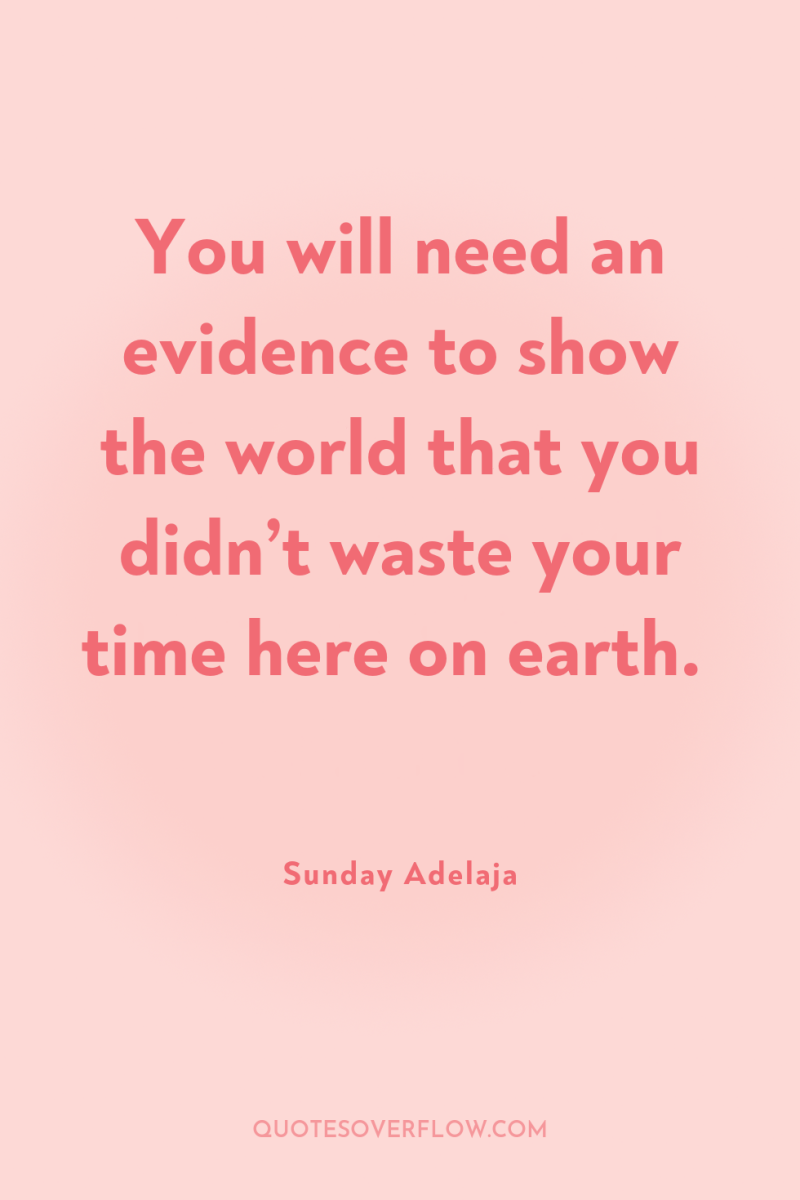
31
You will need an evidence to show the world that you didn’t waste your time here on earth.Sunday Adelaja
32
..What I have denied and what my reason compels me to deny, is the existence of a Being throned above us as a god, directing our mundane affairs in detail, regarding us as individuals, punishing us, rewarding us as human judges might. When the churches learn to take this rational view of things, when they become true schools of ethics and stop teaching fables, they will be more effective than they are to-day.. If they would turn all that ability to teaching this one thing — the fact that honesty is best, that selfishness and lies of any sort must surely fail to produce happiness — they would accomplish actual things. Religious faiths and creeds have greatly hampered our development. They have absorbed and wasted some fine intellects. That creeds are getting to be less and less important to the average mind with every passing year is a good sign, I think, although I do not wish to talk about what is commonly called theology. The criticisms which have been hurled at me have not worried me. A man cannot control his beliefs. If he is honest in his frank expression of them, that is all that can in justice be required of him. Professor Thomson and a thousand others do not in the least agree with me. His criticism of me, as I read it, charged that because I doubted the soul’s immortality, or ‘personality, ’ as he called it, my mind must be abnormal, ‘pathological, ’ in other, words, diseased.. I try to say exactly what I honestly believe to be the truth, and more than that no man can do. I honestly believe that creedists have built up a mighty structure of inaccuracy, based, curiously, on those fundamental truths which I, with every honest man, must not alone admit but earnestly acclaim. I have been working on the same lines for many years. I have tried to go as far as possible toward the bottom of each subject I have studied. I have not reached my conclusions through study of traditions; I have reached them through the study of hard fact. I cannot see that unproved theories or sentiment should be permitted to have influence in the building of conviction upon matters so important. Science proves its theories or it rejects them. I have never seen the slightest scientific proof of the religious theories of heaven and hell, of future life for individuals, or of a personal God. I earnestly believe that I am right; I cannot help believing as I do.. I cannot accept as final any theory which is not provable. The theories of the theologians cannot be proved. Proof, proof! That is what I always have been after; that is what my mind requires before it can accept a theory as fact. Some things are provable, some things disprovable, some things are doubtful. All the problems which perplex us, now, will, soon or late, be solved, and solved beyond a question through scientific investigation. The thing which most impresses me about theology is that it does not seem to be investigating. It seems to be asserting, merely, without actual study.. Moral teaching is the thing we need most in this world, and many of these men could be great moral teachers if they would but give their whole time to it, and to scientific search for the rock-bottom truth, instead of wasting it upon expounding theories of theology which are not in the first place firmly based. What we need is search for fundamentals, not reiteration of traditions born in days when men knew even less than we d .Thomas A. Edison
33
It's natural to think that living things must be the handiwork of a designer. But it was also natural to think that the sun went around the earth. Overcoming naive impressions to figure out how things really work is one of humanity's highest calSteven Pinker
34
I believe in evidence. I believe in observation, measurement, and reasoning, confirmed by independent observers. I'll believe anything, no matter how wild and ridiculous, if there is evidence for it. The wilder and more ridiculous something is, however, the firmer and more solid the evidence will have to be.Isaac Asimov
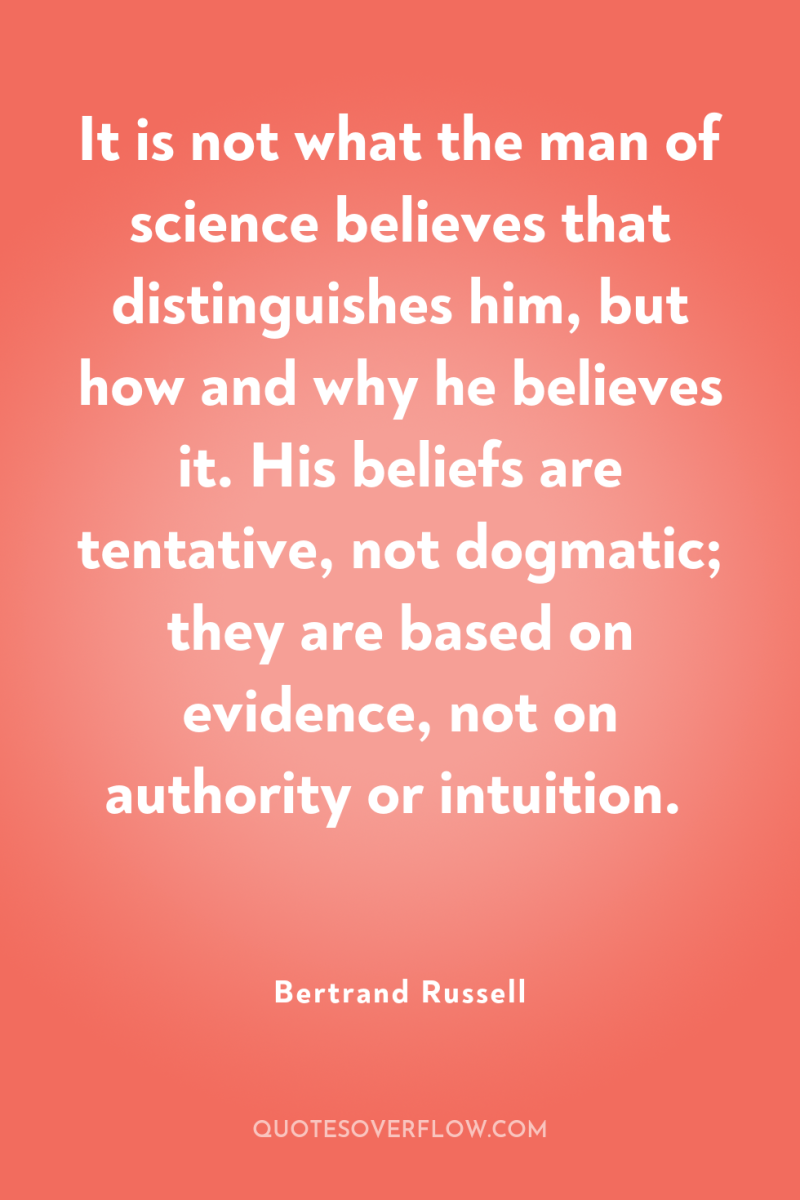
35
It is not what the man of science believes that distinguishes him, but how and why he believes it. His beliefs are tentative, not dogmatic; they are based on evidence, not on authority or intuition.Bertrand Russell
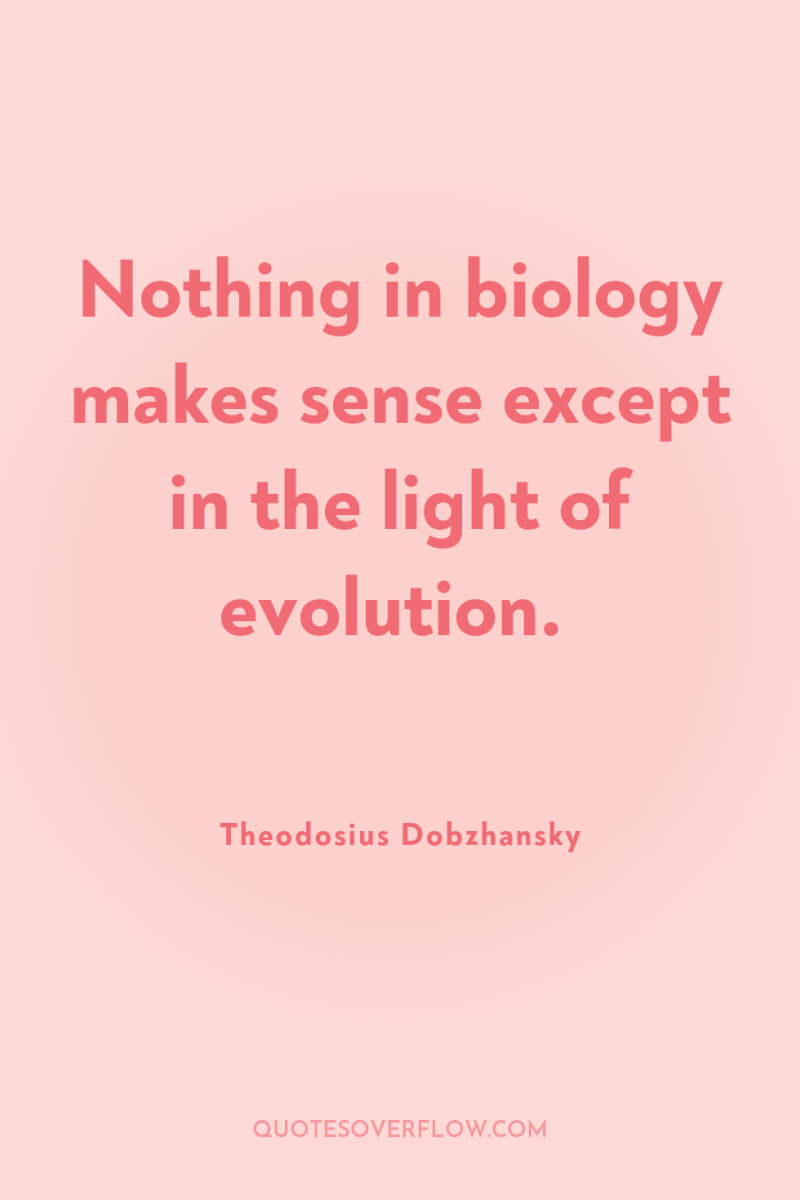
36
Nothing in biology makes sense except in the light of evolution.Theodosius Dobzhansky
37
We get a lot of calls where the person is murdered at home, but is not found for a period of time. And so the animals have already started to take the body apart because they haven't been fed in that period. So your evidence is being chewed up by the family pet. I tell you - Dogs are more loyal than cats. Cats will wait only a certain period of time and they'll start chewing on you. Dogs will wait a day or two before they just can't take the starving anymore. So, keep that in mind when choosing a pet. You know how a cat just stares at you, maybe at the top of the TV, from across the room? That's because they're watching to see if you're gonna stop breathing.Connie Fletcher
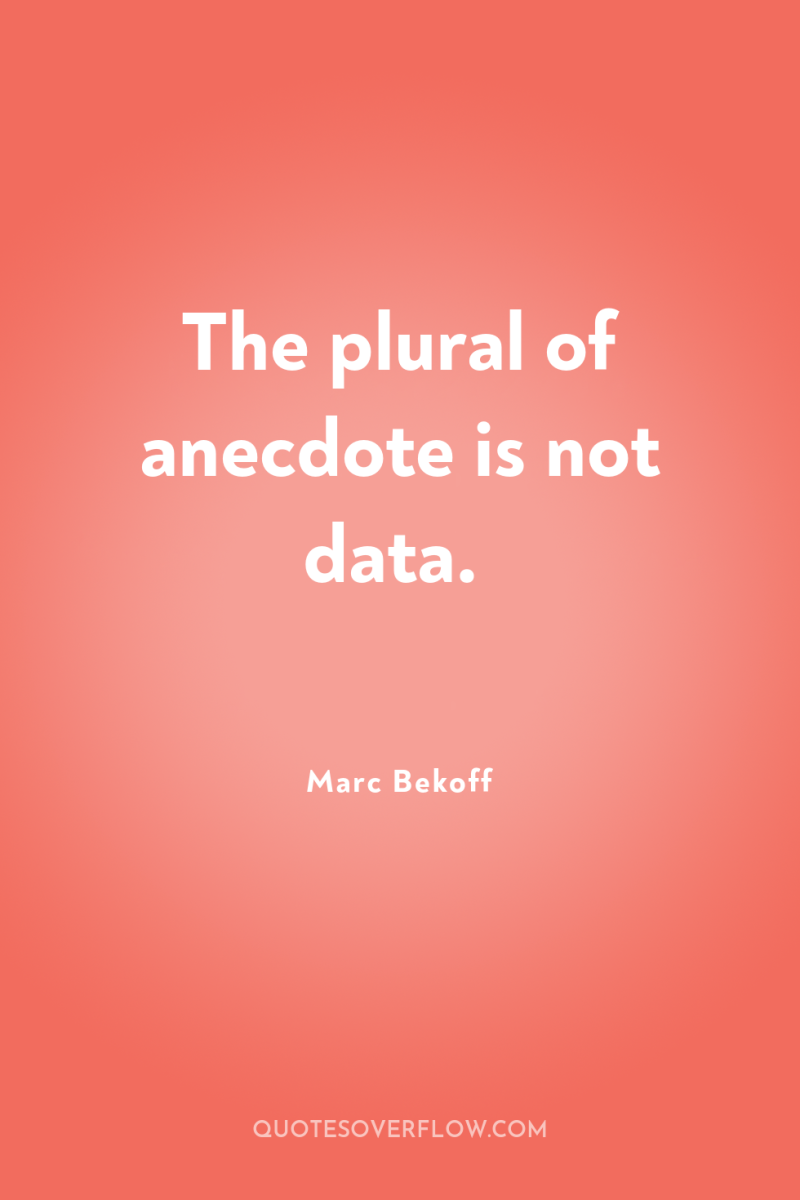
38
The plural of anecdote is not data.Marc Bekoff
39
Mere lack of evidence, of course, is no reason to denounce a theory. Look at intelligent design. The fact that it is bollocks hasn’t stopped a good many people from believing in it. Darwinism itself is only supported by tons of evidence, which is a clear indication that Darwin didn’t write his books himself.Eric Idle
40
To establish evolutionary interrelatedness invariably requires exhibiting similarities between organisms. Within Darwinism, there's only one way to connect such similarities, and that's through descent with modification driven by the Darwinian mechanism. But within a design-theoretic framework, this possibility, though not precluded, is also not the only game in town. It's possible for descent with modification instead to be driven by telic processes inherent in nature (and thus by a form of design). Alternatively, it's possible that the similarities are not due to descent at all but result from a similarity of conception, just as designed objects like your TV, radio, and computer share common components because designers frequently recycle ideas and parts. Teasing apart the effects of intelligent and natural causation is one of the key questions confronting a design-theoretic research program. Unlike Darwinism, therefore, intelligent design has no immediate and easy answer to the question of common descent. Darwinists necessarily see this as a bad thing and as a regression to ignorance. From the design theorists' perspective, however, frank admissions of ignorance are much to be preferred to overconfident claims to knowledge that in the end cannot be adequately justified. Despite advertisements to the contrary, science is not a juggernaut that relentlessly pushes back the frontiers of knowledge. Rather, science is an interconnected web of theoretical and factual claims about the world that are constantly being revised and for which changes in one portion of the web can induce radical changes in another. In particular, science regularly confronts the problem of having to retract claims that it once confidently asserted.William A. Dembski
41
For God to prove himself on demand, physically, would be a grave disappointment, and the strongest Christians should be considerably grateful that he chooses not to do so. The skeptic endlessly demands proof, yet God refuses to insult the true intelligence of man, the '6th sense', the chief quality, the acumen which distinguishes man from the rest of creation, faith.Criss Jami
42
The Kalam Cosmological Argument, The Fine-Tuning Argument, and The Local Fine-Tuning Argument all do an end-run around the issue of special creation verses evolution. These evidences establish the existence of a Creator of the universe. Thanks to The Kalam Cosmological Argument and the two Fine-Tuning Arguments, the atheist’s goose is cooked before we even get to the issue of the origin of life much less the adequacy of random mutations and natural selection to produce new species of animals! .. I can give the atheist evolution for free. He still has to deal with all of the arguments in this book.Evan Minton
43
The hand of God is wonderfully evident at those times when He pens stories whose lines we ourselves are far too fearful to pen or whose imaginations are far too limited to envision. And I would unashamedly suggest that the Christmas story is that very story.Craig D. Lounsbrough
44
So why don't they face us... examine our evidence, debate, talk... act like real historians instead of thought-police? Why shut us out of the media, pass laws against our speaking, persecute us, sue us, and vilify us?Randolph D. Calverhall
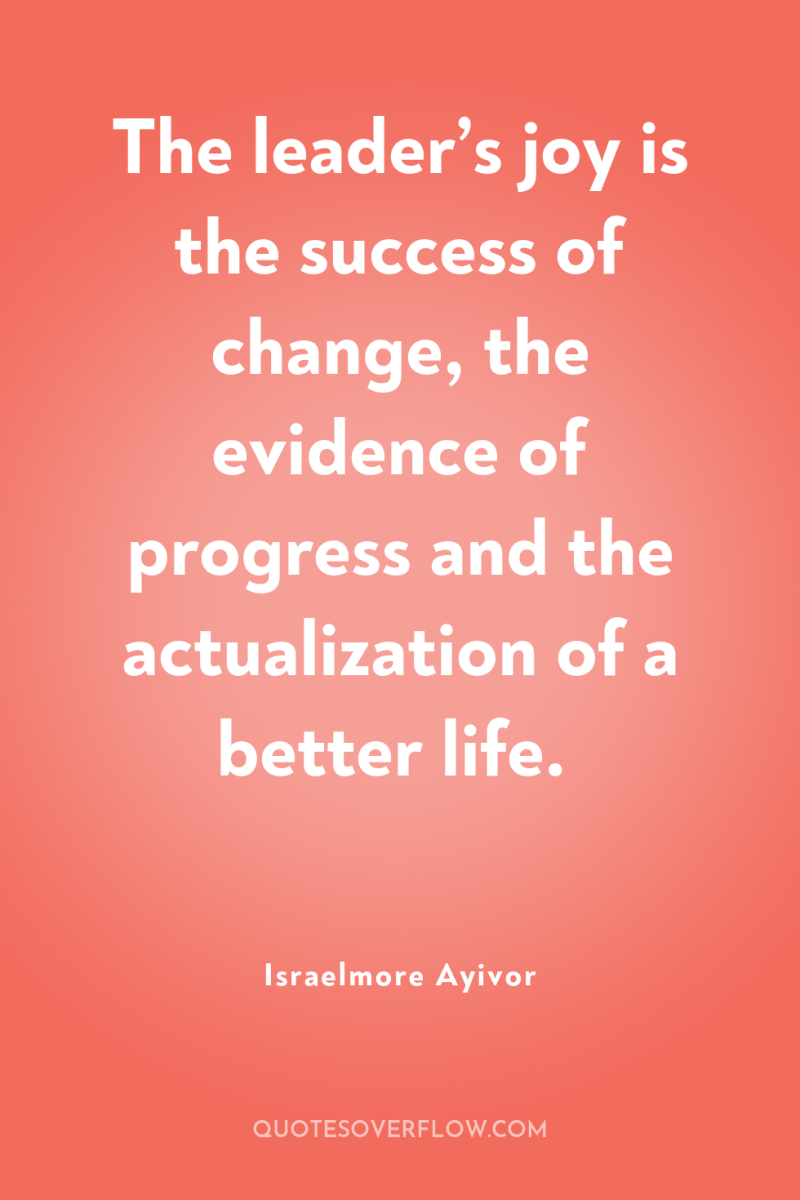
45
The leader’s joy is the success of change, the evidence of progress and the actualization of a better life.Israelmore Ayivor
46
When considering the topic of spirituality or religion, I would encourage you to look at Christianity first. It is a testable religion. That is, it is based on evidence. The evidence is philosophical and historical. It can be examined and then we can all make our decision.Jon Morrison

47
Despite my best effort to make myself as large as absolutely possible, life will always be larger than me. That simple fact makes God not only a likelihood, but a necessity.Craig D. Lounsbrough
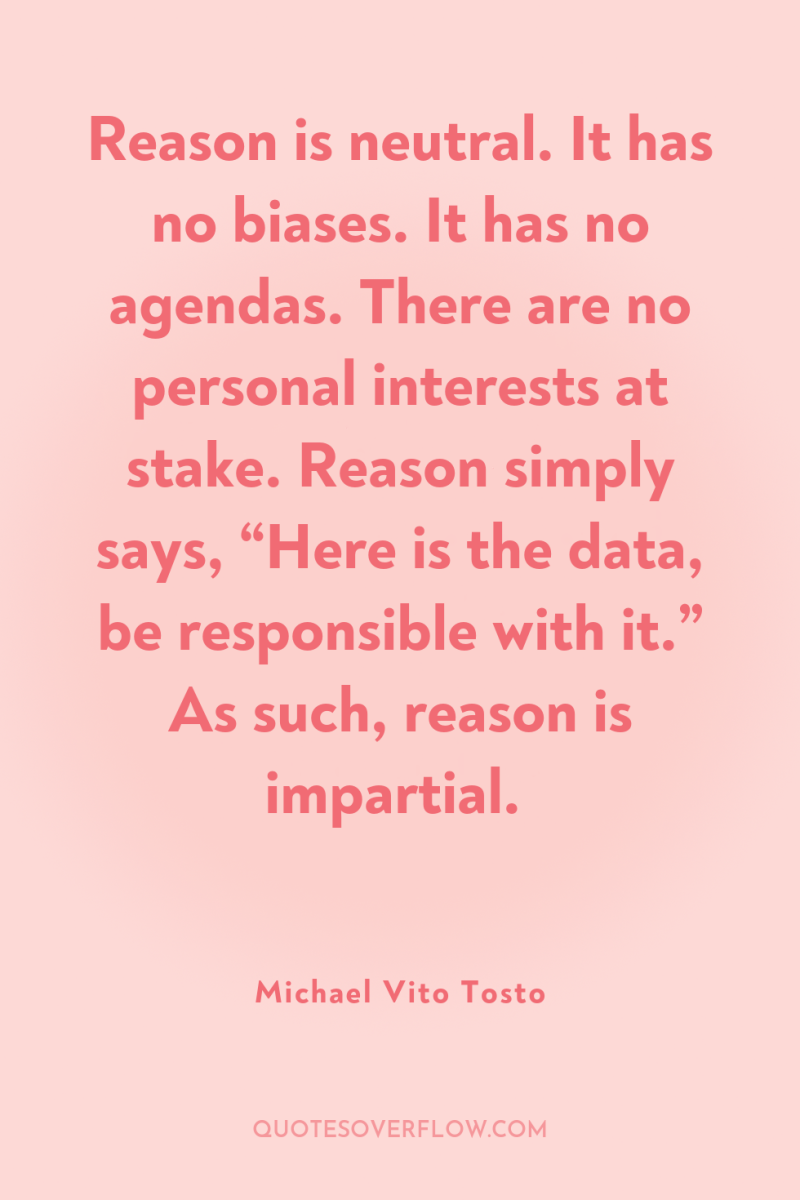
48
Reason is neutral. It has no biases. It has no agendas. There are no personal interests at stake. Reason simply says, “Here is the data, be responsible with it.” As such, reason is impartial.Michael Vito Tosto
49
The evidence which we have of the great facts of the Bible history belongs to this class, that is, it is moral evidence; sufficient to satisfy any rational mind, by carrying it to the highest degree of moral certainty. If such evidence well justify the taking away of human life or liberty, in the one case, surely it ought to be deemed sufficient to determine our faith in the other.Simon Greenleaf
50
But the Christian writer seems, by the usual course of the argument, to have been deprived of the common presumption of charity in his favor; and reversing the ordinary rule of administering justice in human tribunals, his testimony is unjustly presumed to be false, until it is proved to be true..{independent historians} have been treated, in the argument, almost as if the New Testament were the entire production, at once, of a body of men, conspiring by a joint fabrication, to impose a false religion upon the world.Simon Greenleaf
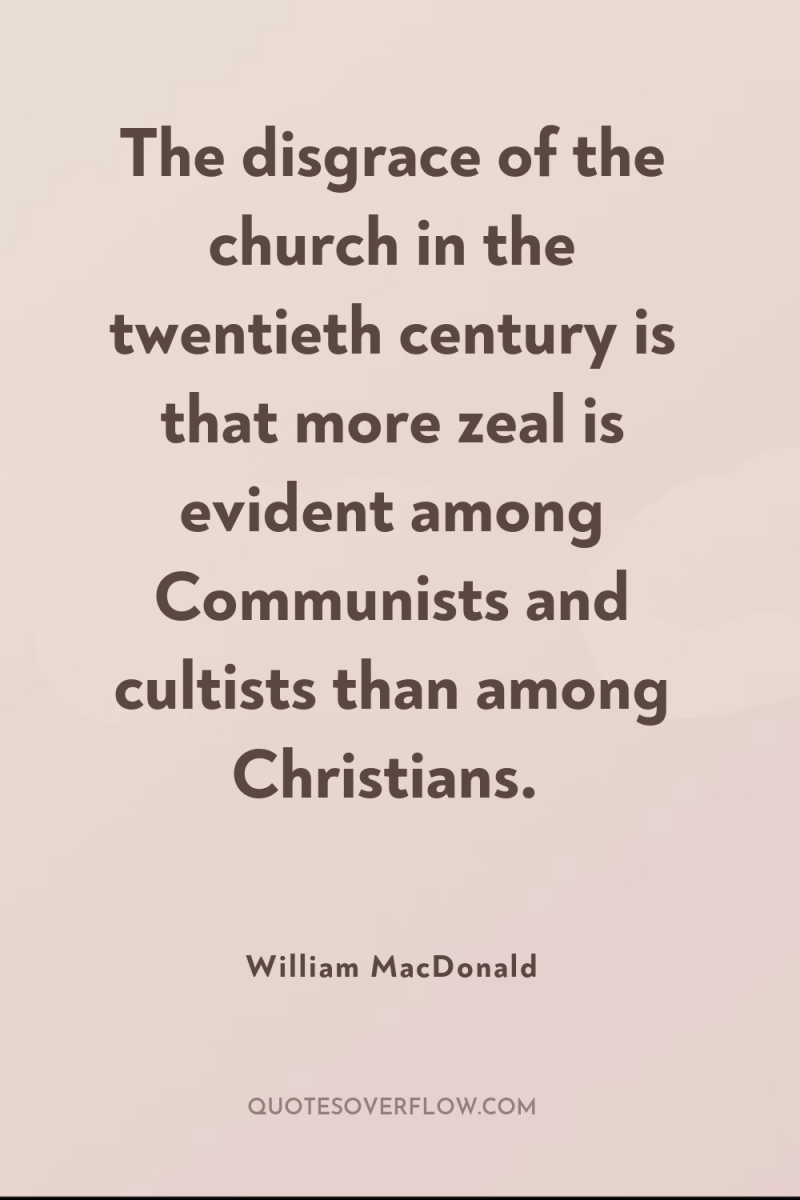
51
The disgrace of the church in the twentieth century is that more zeal is evident among Communists and cultists than among Christians.William MacDonald
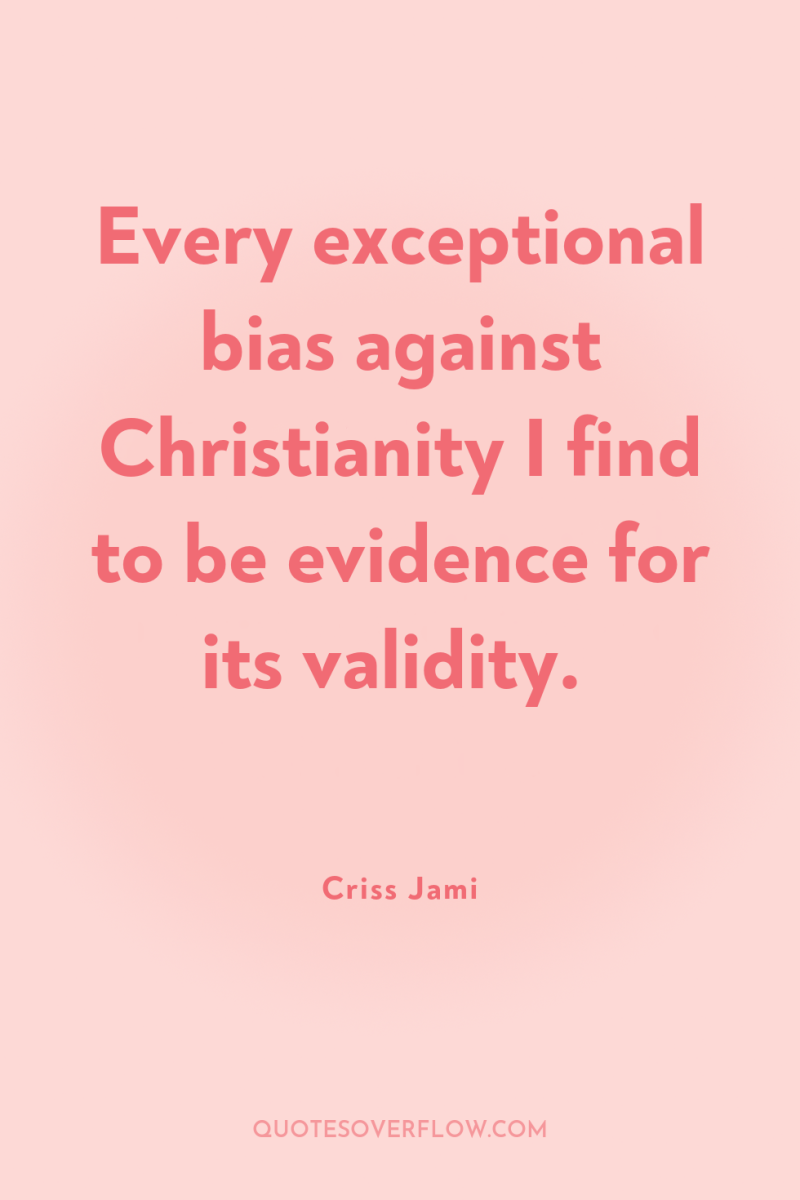
52
Every exceptional bias against Christianity I find to be evidence for its validity.Criss Jami
53
I think it’s important to reason from first principles rather than by analogy. The normal way we conduct our lives is we reason by analogy. [With analogy] we are doing this because it’s like something else that was done, or it is like what other people are doing. [With first principles] you boil things down to the most fundamental truths…and then reason up from there.Elon Musk
54
The most preposterous notion that Homo sapiens has ever dreamed up is that the Lord God of Creation, Shaper and Ruler of all the Universes, wants the saccharine adoration of His creatures, can be swayed by their prayers, and becomes petulant if He does not receive this flattery. Yet this absurd fantasy, without a shred of evidence to bolster it, pays all the expenses of the oldest, largest, and least productive industry in all history.Robert A. Heinlein
55
..Whilst on board the Beagle I was quite orthodox, and I remember being heartily laughed at by several of the officers.. for quoting the Bible as an unanswerable authority on some point of morality.. But I had gradually come by this time, i.e., 1836 to 1839, to see that the Old Testament from its manifestly false history of the world, with the Tower of Babel, the rainbow at sign, &c., &c., and from its attributing to God the feelings of a revengeful tyrant, was no more to be trusted than the sacred books of the Hindoos, or the beliefs of any barbarian.. By further reflecting that the clearest evidence would be requisite to make any sane man believe in the miracles by which Christianity is supported, (and that the more we know of the fixed laws of nature the more incredible do miracles become), that the men at that time were ignorant and credulous to a degree almost uncomprehensible by us, that the Gospels cannot be proved to have been written simultaneously with the events, that they differ in many important details, far too important, as it seemed to me, to be admitted as the usual inaccuracies of eyewitnesses; by such reflections as these, which I give not as having the least novelty or value, but as they influenced me, I gradually came to disbelieve in Christianity as a divine revelation. The fact that many false religions have spread over large portions of the earth like wild-fire had some weight with me. Beautiful as is the morality of the New Testament, it can be hardly denied that its perfection depends in part on the interpretation which we now put on metaphors and allegories. But I was very unwilling to give up my belief.. Thus disbelief crept over me at a very slow rate, but was at last complete. The rate was so slow that I felt no distress, and have never since doubted even for a single second that my conclusion was correct. I can indeed hardly see how anyone ought to wish Christianity to be true; for if so the plain language of the text seems to show that the men who do not believe, and this would include my Father, Brother and almost all of my friends, will be everlastingly punished. And this is a damnable doctrine.Charles Darwin
56
It does appear that some parts of our evolutionary process seem inevitable. It is striking that throughout evolutionary history, the eye evolved independently fifty to a hundred times. This is strong evidence for the fact that the different rolls of the dice that have occurred across different species seem to have produced species with eyes regardless of what is going on around them. Lots of other examples illustrate how some features, if they are advantageous, seem to rise to the top of the evolutionary swamp. This is illustrated every time you see the same feature appearing more than once in different parts of the animal kingdom. Dolphins and bats, for example, use echolocation, but they evolved this trait independently at very different points on the evolutionary tree.Marcus Du Sautoy
57
Truth is only relative to those that ignore hard evidence.A.E. Samaan
58
No one can destroy the love God has for you. When you abide in truth, you also abide in love. And truth is evidence of love. Nothing can destroy the power of trusting and loving unconditionally.Amaka Imani Nkosazana
59
The desire to retire early is an evidence of your current state of mind if you continue this way you will ‘retire early! ! ! ! !Harrish Sairaman
60
Christians must show that misery fits the good for heaven, while happiness prepares the bad for hell; that the wicked get all their good things in this life, and the good all their evil; that in this world God punishes the people he loves, and in the next, the ones he hates; that happiness makes us bad here, but not in heaven; that pain makes us good here, but not in hell. No matter how absurd these things may appear to the carnal mind, they must be preached and they must be believed. If they were reasonable, there would be no virtue in believing. Even the publicans and sinners believe reasonable things. To believe without evidence, or in spite of it, is accounted as righteousness to the sincere and humble christian. In short, Christians are expected to denounce all pleasant paths and rustling trees, to curse the grass and flowers, and glorify the dust and weeds. They are expected to malign the wicked people in the green and happy fields, who sit and laugh beside the gurgling springs or climb the hills and wander as they will. They are expected to point out the dangers of freedom, the safety of implicit obedience, and to show the wickedness of philosophy, the goodness of faith, the immorality of science and the purity of ignorance.Robert G. Ingersoll
61
The real difference is this: the Christian says that he has knowledge; the Agnostic admits that he has none; and yet the Christian accuses the Agnostic of arrogance, and asks him how he has the impudence to admit the limitations of his mind. To the Agnostic every fact is a torch, and by this light, and this light only, he walks. The Agnostic knows that the testimony of man is not sufficient to establish what is known as the miraculous. We would not believe to-day the testimony of millions to the effect that the dead had been raised. The church itself would be the first to attack such testimony. If we cannot believe those whom we know, why should we believe witnesses who have been dead thousands of years, and about whom we know nothing? The Agnostic takes the ground that human experience is the basis of morality. Consequently, it is of no importance who wrote the gospels, or who vouched or vouches for the genuineness of the miracles. In his scheme of life these things are utterly unimportant. He is satisfied that “the miraculous” is the impossible. He knows that the witnesses were wholly incapable of examining the questions involved, that credulity had possession of their minds, that 'the miraculous' was expected, that it was their daily food. .Robert G. Ingersoll
62
People who have cut their teeth on philosophical problems of rationality, knowledge, perception, free will and other minds are well placed to think better about problems of evidence, decision making, responsibility and ethics that life throws up.Simon Blackburn
63
We must speak truth to power and confront ignorance with facts.DaShanne Stokes
64
The evidence never seemed to matter to those in power, who had already made up their minds and did what people typically do when their worldview is threatened by new data: they attacked the messenger.Sol Luckman
65
The evidence of Martin Luther King Jnr’s “I have a dream” declaration was a passionate confirmation of how a dream meant for liberation, success and fulfilled life can become true.Israelmore Ayivor
66
The book argues that even though many cases have been held up as classic examples of modern American “witch hunts, ” none of them fits that description. McMartin certainly comes close. But a careful examination of the evidence presented at trial demonstrates why, in my view, a reasonable juror could vote for conviction, as many did in this case. Other cases that have been painted as witch-hunts turn out to involve significant, even overwhelming, evidence of guilt. There are a few cases to the contrary, but even those are more complicated than the witch-hunt narrative allows. In short, there was not, by any reasonable measure, an epidemic of “witch hunts” in the 1980s. There were big mistakes made in how some cases were handled, particularly in the earliest years. But even in those years there were cases such as those of Frank Fuster and Kelly Michaels that, I believe, were based on substantial evidence but later unfairly maligned as having no evidentiary support.Ross Cheit
67
I believe that religion, generally speaking, has been a curse to mankind – that its modest and greatly overestimated services on the ethical side have been more than overcome by the damage it has done to clear and honest thinking. I believe that no discovery of fact, however trivial, can be wholly useless to the race, and that no trumpeting of falsehood, however virtuous in intent, can be anything but vicious. I believe that the evidence for immortality is no better than the evidence of witches, and deserves no more respect. I believe in the complete freedom of thought and speech – alike for the humblest man and the mightiest, and in the utmost freedom of conduct that is consistent with living in organized society. I believe in the capacity of man to conquer his world, and to find out what it is made of, and how it is run. I believe in the reality of progress. I –But the whole thing, after all, may be put very simply. I believe that it is better to tell the truth than to lie. I believe that it is better to be free than to be a slave. And I believe that it is better to know than be ignorant. .H.l. Mencken
68
In the Light of your Wisdom, You Shine. In the Midst of your Truth, Your Faith is Evident. From inside your Spirit, You are Love.Amaka Imani Nkosazana
69
In like manner, if I let myself believe anything on insufficient evidence, there may be no great harm done by the mere belief; it may be true after all, or I may never have occasion to exhibit it in outward acts. But I cannot help doing this great wrong towards Man, that I make myself credulous. The danger to society is not merely that it should believe wrong things, though that is great enough; but that it should become credulous, and lose the habit of testing things and inquiring into them; for then it must sink back into savagery.William Kingdon Clifford
70
In a world where critical thinking skills are almost wholly absent, repetition effectively leapfrogs the cognitive portion of the brain. It helps something get processed as truth. We used to call it unsubstantiated buy-in. Belief without evidence. It only works in a society where thinking for one's self is discouraged. That's how we lost our country.Laura Bynum
71
A system of justice does not need to pursue retribution. If the purpose of drug sentencing is to prevent harm, all we need to do is decide what to do with people who pose a genuine risk to society or cause tangible harm. There are perfectly rational ways of doing this; in fact, most societies already pursue such policies with respect to alcohol: we leave people free to drink and get inebriated, but set limits on where and when. In general, we prosecute drunk drivers, not inebriated pedestrians. In this sense, the justice system is in many respects a battleground between moral ideas and evidence concerning how to most effectively promote both individual and societal interests, liberty, health, happiness and wellbeing. Severely compromising this system, insofar as it serves to further these ideals, is our vacillation or obsession with moral responsibility, which is, in the broadest sense, an attempt to isolate the subjective element of human choice, an exercise that all too readily deteriorates into blaming and scapegoating without providing effective solutions to the actual problem. The problem with the question of moral responsibility is that it is inherently subjective and involves conjecture about an individuals’ state of mind, awareness and ability to act that can rarely if ever be proved. Thus it involves precisely the same type of conjecture that characterizes superstitious notions of possession and the influence of the devil and provides no effective means of managing conduct: the individual convicted for an offence or crime considered morally wrong is convicted based on a series of hypotheses and probabilities and not necessarily because he or she is actually morally wrong. The fairness and effectiveness of a system of justice based on such hypotheses is highly questionable particularly as a basis for preventing or reducing drug use related harm. For example, with respect to drugs, the system quite obviously fails as a deterrent and the system is not organised to ‘reform’ the offender much less to ensure that he or she has ‘learned a lesson’; moreover, the offender does not get an opportunity to make amends or even have a conversation with the alleged victim. In the case of retributive justice, the justice system is effectively mopping up after the fact. In other words, as far as deterrence is concerned, the entire exercise of justice becomes an exercise based on faith, rather than one based on evidence.Daniel Waterman
72
We must not overlook the role that extremists play. They are the gadflies that keep society from being too complacent or self-satisfied; they are, if sound, the spearhead of progress. If they are fundamentally wrong, free discussion will in time put an end to them.Abraham Flexner
73
What I'd like to read is a scientific review, by a scientific psychologist--if any exists--of 'A Scientific Man and the Bible'. By what route do otherwise sane men come to believe such palpable nonsense? How is it possible for a human brain to be divided into two insulated halves, one functioning normally, naturally and even brilliantly, and the other capable only of such ghastly balderdash which issues from the minds of Baptist evangelists? Such balderdash takes various forms, but it is at its worst when it is religious. Why should this be so? What is there in religion that completely flabbergasts the wits of those who believe in it? I see no logical necessity for that flabbergasting. Religion, after all, is nothing but an hypothesis framed to account for what is evidentially unaccounted for. In other fields such hypotheses are common, and yet they do no apparent damage to those who incline to them. But in the religious field they quickly rush the believer to the intellectual Bad Lands. He not only becomes anaesthetic to objective fact; he becomes a violent enemy of objective fact. It annoys and irritates him. He sweeps it away as something somehow evil..H.l. Mencken
74
Wherever sufficiently numerous series of the remains of any given group, which has endured for a long space of time, are carefully examined, their morphological relations are never in discordance with the requirements of the doctrine of evolution, and often afford convincing evidence of it. At the same time, it has been shown that certain forms persist with very little change, from the oldest to the newest fossiliferous formations; and thus show that progressive development is a contingent, and not a necessary result, of the nature of living matter.Thomas Henry Huxley
75
The fact that an opinion has been widely held is no evidence whatever that it is not utterly absurd; indeed in view of the silliness of the majority of mankind, a widely spread belief is more likely to be foolish than sensible.Bertrand Russell
76
Does a man of sense run after every silly tale of hobgoblins or fairies, and canvass particularly the evidence? I never knew anyone, that examined and deliberated about nonsense who did not believe it before the end of his enquiries.David Hume
77
It is wrong always, everywhere, and for anyone, to believe anything upon insufficient evidence.William Kingdon Clifford
78
The denial of Christ has less to do with facts and more to do with the bent of what a person is prejudiced to conclude.Ravi Zacharias
79
Every time we let ourselves believe for unworthy reasons, we weaken our powers of self-control, of doubting, of judicially and fairly weighing evidence. We all suffer severely enough from the maintenance and support of false beliefs and the fatally wrong actions which they lead to, and the evil born when one such belief is entertained is great and wide.William Kingdon Clifford
80
The claim to know that no god exists is just irrational. The non-existence of any god has no evidence, let alone proof. To know something for certain there must be proof. To hold to a belief there must be evidence. Untilthen, the only actual reasonable position is agnosticism.Lewis N. Roe
81
Having been shown the possibility that God exists, the atheist haschosen not to accept it. They have no proof or even evidence oftheir belief, but will stick by it. This takes blind faith.Lewis N. Roe
82
Our duty is to believe that for which we have sufficient evidence, and to suspend our judgment when we have not.John Lubbock
83
In learning and argumentation, the quality brain is similar to a facility of maximum security. What passes the logic test, free of fallacy and pretense, then must pass the test of biblical accuracy in order to proceed as an adopted, reliable truth.Criss Jami
84
When also I am told that a woman, called the Virgin Mary, said, or gave out, that she was with child without any cohabitation with a man, and that her betrothed husband, Joseph, said that an angel told him so, I have a right to believe them or not: such a circumstance required a much stronger evidence than their bare word for it: but we have not even this; for neither Joseph nor Mary wrote any such matter themselves. It is only reported by others that they said so. It is hearsay upon hearsay, and I do not chose to rest my belief upon such evidence.Thomas Paine
85
It appears now to be universally admitted that, before the exile, the Israelites had no belief in rewards and punishments after death, nor in anything similar to the Christian heaven and hell; but our story proves that it would be an error to suppose that they did not believe in the continuance of individual existence after death by a ghostly simulacrum of life. Nay, I think it would be very hard to produce conclusive evidence that they disbelieved in immortality; for I am not aware that there is anything to show that they thought the existence of the souls of the dead in Sheol ever came to an end. But they do not seem to have conceived that the condition of the souls in Sheol was in any way affected by their conduct in life. If there was immortality, there was no state of retribution in their theology. Samuel expects Saul and his sons to come to him in Sheol.Thomas Henry Huxley
86
I am an infidel today. I do not believe what has been served to me to believe. I am a doubter, a questioner, a skeptic. When it can be proved to me that there is immortality, that there is resurrection beyond the gates of death, then will I believe. Until then, no.Luther Burbank
87
When I wake up I go through an abbreviated process of mourning all over again. Plainly, there’s something within me that’s ready to believe in life after death. And it’s not the least bit interested in whether there’s any sober evidence for it.Carl Sagan
88
Leonardo believed his research had thepotential to convert millions to a more spiritual life. Last year he categorically proved the existence ofan energy force that unites us all. He actually demonstrated that we are all physically connected… thatthe molecules in your body are intertwined with the molecules in mine… that there is a single forcemoving within all of us.” Langdon felt disconcerted. And the power of God shall unite us all. “Mr. Vetra actually found a wayto demonstrate that particles are connected?”“ Conclusive evidence. A recent Scientific American article hailed New Physics as a surer path to Godthan religion itself. .Dan Brown
89
Suppose that members of a religious movement, such as Christianity, maintain that the existence of some powerful god and its goals or laws can be known through their scriptures, their prophets, or some special revelation. Suppose further that the evidence that is available to support the reliability of those scriptures, prophets, or special revelations is weaker than that God is hypothetically capable of producing. That is, suppose that Christians maintain that Jesus was resurrected on the basis of the Gospels, or that God’s existence can be known through the Bible, or Muslims insist on the historical authenticity of the Koran. Could God, the almighty creator of the universe, have brought it about so that the evidence in favor of the resurrection, the Bible, or the Koran was better than we currently find it? I take it that the answer is obviously yes. Even if you think there is evidence that is sufficient to prove the resurrection, a reasonable person must also acknowledge that it could have been better. And there’s the problem. If the capacity of that god is greater than the effectiveness or quality of those scriptures, prophets, or special revelations, then the story they are telling contradicts itself. 'We know our god is real on the basis of evidence that is inadequate for our god.' Or, 'The grounds that lead us to believe in our god are inconsistent with the god we accept; nevertheless, we believe in this god that would have given us greater evidence if it had wished for us to believe in it.' Given the disparity between the gods that these religious movements portend and the grounds offered to justify them, the atheist is warranted in dismissing such claims. If the sort of divine being that they promote were real and if he had sought our believe on the basis of the evidence, the evidential situation would not resemble the one we are in. The story doesn’t make internal sense. A far better explanation is that their enthusiasm for believing in a god has led them to overstate what the evidence shows. And that same enthusiasm has made it difficult for them to see that an all powerful God would have the power to make his existence utterly obvious and undeniable. Since it’s not, the non-believer can’t possibly be faulted for failing to believe. .Matthew S. McCormick
90
The scientist believes in proof without certainty, the bigot in certainty without proof.Ashley Montagu
91
If there is a god maybe it rewards those who don't believe on the basis of insufficient evidence--and punishes those who do.Peter Boghossian
92
We should be agnostic about those things for which there is no evidence. We should not hold beliefs merely because they gratify our desires for afterlife, immortality, heaven, hell, etc.Julian Huxley
93
If you want me to believe in God, you must make me touch him.Denis Diderot
94
I believe in you and me. I'm like Albert Schweitzer and Bertrand Russell and Albert Einstein in that I have a respect for life -- in any form. I believe in nature, in the birds, the sea, the sky, in everything I can see or that there is real evidence for. If these things are what you mean by God, then I believe in God. But I don't believe in a personal God to whom I look for comfort or for a natural on the next roll of the dice.Frank Sinatra
95
It takes the trust of God for things that exist, to wait on him for the evidence of things that do not exist. Faith and hope make you to thank God for the invisible things by looking at the visible things which were once invisible too.Israelmore Ayivor
96
It is now established by verifiable evidence that religion stultifies the brain and is the great obstacle in the path of intellectual progress. The more religious a person is, the more he is steeped in ignorance and superstition, the less is his sense of moral responsibility. The more intelligent a person, the less religious he is. There is an old saying that 'where there are three scientists, there are two atheists.' The countries whose governments are dominated by religion and religious institutions are the most backward. By the same token, the countries whose people are the most enlightened, and whose governments are based upon the principle of secularism–the separation of church and state–are the most progressive. And let me tell you: When man is intellectually free, the progress he will make is beyond calculation.Joseph Lewis
97
[Cornell University will be] an asylum for Science–where truth shall be sought for truth's sake, not stretched or cut exactly to fit Revealed Religion.Andrew Dickson White
98
This vacillation between assertion and denial in discussions about organised abuse can be understood as functional, in that it serves to contain the traumatic kernel at the heart of allegations of organised abuse. In his influential ‘just world’ theory, Lerner (1980) argued that emotional wellbeing is predicated on the assumption that the world is an orderly, predictable and just place in which people get what they deserve. Whilst such assumptions are objectively false, Lerner argued that individuals have considerable investment in maintaining them since they are conducive to feelings of self–efficacy and trust in others. When they encounter evidence contradicting the view that the world is just, individuals are motivated to defend this belief either by helping the victim (and thus restoring a sense of justice) or by persuading themselves that no injustice has occurred. Lerner (1980) focused on the ways in which the ‘just world’ fallacy motivates victim-blaming, but there are other defences available to bystanders who seek to dispel troubling knowledge. Organised abuse highlights the severity of sexual violence in the lives of some children and the desire of some adults to inflict considerable, and sometimes irreversible, harm upon the powerless. Such knowledge is so toxic to common presumptions about the orderly nature of society, and the generally benevolent motivations of others, that it seems as though a defensive scaffold of disbelief, minimisation and scorn has been erected to inhibit a full understanding of organised abuse. Despite these efforts, there has been a recent resurgence of interest in organised abuse and particularly ritualistic abuse (eg Sachs and Galton 2008, Epstein et al. 2011, Miller 2012).Michael Salter
99
Some readers may find it a curious or even unscientific endeavour to craft a criminological model of organised abuse based on the testimony of survivors. One of the standard objections to qualitative research is that participants may lie or fantasise in interview, it has been suggested that adults who report severe child sexual abuse are particularly prone to such confabulation. Whilst all forms of research, whether qualitative or quantitative, may be impacted upon by memory error or false reporting. there is no evidence that qualitative research is particularly vulnerable to this, nor is there any evidence that a fantasy– or lie–prone individual would be particularly likely to volunteer for research into child sexual abuse. Research has consistently found that child abuse histories, including severe and sadistic abuse, are accurate and can be corroborated (Ross 2009, Otnow et al. 1997, Chu et al. 1999). Survivors of child abuse may struggle with amnesia and other forms of memory disturbance but the notion that they are particularly prone to suggestion and confabulation has yet to find a scientific basis. It is interesting to note that questions about the veracity of eyewitness evidence appear to be asked far more frequently in relation to sexual abuse and rape than in relation to other crimes. The research on which this book is based has been conducted with an ethical commitment to taking the lives and voices of survivors of organised abuse seriously. .Michael Salter
100
Nevertheless, scientific method is not the same as the scientific spirit. The scientific spirit does not rest content with applying that which is already known, but is a restless spirit, ever pressing forward towards the regions of the unknown, and endeavouring to lay under contribution for the special purpose in hand the knowledge acquired in all portions of the wide field of exact science. Lastly, it acts as a check, as well as a stimulus, sifting the value of the evidence, and rejecting that which is worthless, and restraining too eager flights of the imagination and too hasty conclusions.Archibald E. Garrod